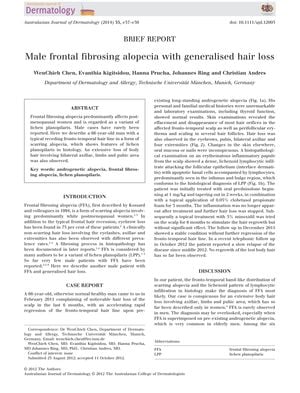TLDR A 66-year-old man with a rare case of male frontal fibrosing alopecia did not regrow hair despite treatment.
The document reports a case of a 66-year-old man with male frontal fibrosing alopecia (FFA), a condition that predominantly affects postmenopausal women and is considered a variant of lichen planopilaris (LPP). The patient presented with a receding fronto-temporal hairline and extensive loss of body hair, including the axillae, limbs, and pubic area. Histopathological examination confirmed the diagnosis of LPP. Treatment with oral prednisolone and topical clobetasol propionate foam halted the progression of hair loss, but a 6-month trial with 5% minoxidil did not stimulate significant hair regrowth. At follow-up, the patient's condition was stable, but he reported a slow relapse of the disease by October 2012, with no regrowth of lost body hair. The case highlights the rarity of FFA in men and the challenges in its treatment, emphasizing the need for more evidence to determine the effectiveness of early aggressive intervention for an optimal prognosis.
 8 citations
,
September 2011 in “European Journal of Dermatology”
8 citations
,
September 2011 in “European Journal of Dermatology” Most treatments for Frontal Fibrosing Alopecia are ineffective, but early anti-inflammatory therapy may help and the condition may stabilize over time.
159 citations
,
August 2010 in “British journal of dermatology/British journal of dermatology, Supplement” Hydroxychloroquine effectively reduces symptoms of frontal fibrosing alopecia, especially in the first 6 months.
 53 citations
,
May 2010 in “Dermatologic Surgery”
53 citations
,
May 2010 in “Dermatologic Surgery” Hair transplantation may not work for Frontal Fibrosing Alopecia as transplanted hair was lost when the disease came back.
 64 citations
,
January 2005 in “International Journal of Dermatology”
64 citations
,
January 2005 in “International Journal of Dermatology” Hair transplant destroyed by lichen planopilaris.
 158 citations
,
February 2000 in “Archives of dermatology”
158 citations
,
February 2000 in “Archives of dermatology” Some people with pattern hair loss may also have scalp inflammation and scarring similar to lichen planopilaris.
 May 2018 in “Journal of dermatology and dermatitis”
May 2018 in “Journal of dermatology and dermatitis” PRP is a promising treatment for autoimmune hair loss but its exact workings are not fully understood.
 22 citations
,
January 2017 in “Indian Dermatology Online Journal”
22 citations
,
January 2017 in “Indian Dermatology Online Journal” Body hair transplants can treat baldness but differ from scalp hair and need more research on long-term results and side effects.
 58 citations
,
September 2012 in “Dermatologic Clinics”
58 citations
,
September 2012 in “Dermatologic Clinics” Male pattern hair loss caused by follicular miniaturization; early diagnosis and treatment can reduce psychological burden.
 21 citations
,
May 1996 in “Current problems in dermatology”
21 citations
,
May 1996 in “Current problems in dermatology” Detailed patient history and physical exams are crucial for diagnosing hair loss.
 26 citations
,
January 1994 in “McGraw-Hill eBooks”
26 citations
,
January 1994 in “McGraw-Hill eBooks” Many hair loss conditions can be treated.
 5 citations
,
October 1988 in “Clinics in Dermatology”
5 citations
,
October 1988 in “Clinics in Dermatology” Minoxidil promotes hair growth but exact mechanism is unknown.











